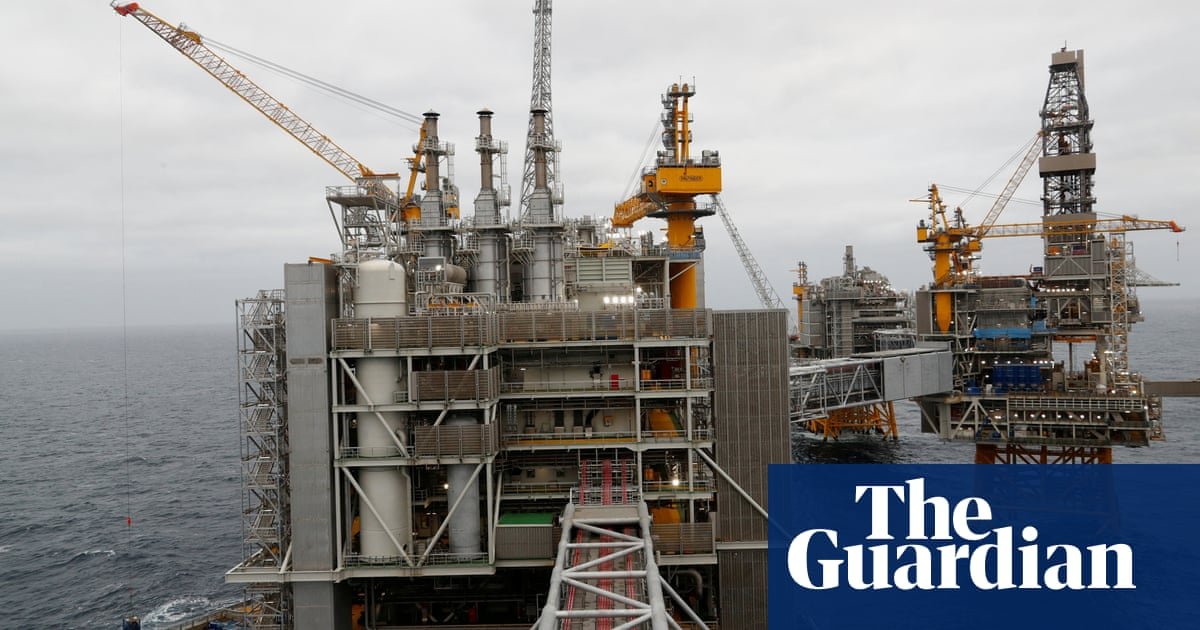The Norwegian oil company fighting to open a giant new oilfield off Shetland has cut billions of pounds from its green spending plans in favour of producing more fossil fuels.
Equinor set out plans on Wednesday to halve its investments in low-carbon energy while producing more oil and gas, becoming the latest in a line of fossil fuel firms to backtrack on its green promises.
Norway’s state oil company told investors it would cut spending on renewable energy and other low-carbon technologies from a planned $10bn (£8bn) to $5bn over the next two years.
The green budget cuts will slow the growth of its low-carbon energy business, which includes some of the UK’s largest offshore windfarms, to 10-12 gigawatts (GW) . Its previous target was 12-16GW.
It also plans to produce 2.2m barrels of oil equivalent a day by 2030, which is 10% higher than its previous plans. The company hopes to fuel this growth with barrels from Britain’s biggest untapped oilfield at Rosebank in the North Sea – despite a landmark court ruling that the government’s decision to approve the project was unlawful.
The Rosebank project has spurred debate over whether or not the Labour government can successfully pursue its green agenda while delivering economic growth.
The party came to power with the promise to end new North Sea oil and gas exploration licences while respecting existing ones. However, climate campaigners have piled pressure on ministers to block the development of Rosebank, which received its licence in 2023, by refusing it a final consent permit to produce oil under a new regime that will be finalised in spring.
The uncertainty has laid bare a rift in the government between the energy secretary, Ed Miliband, who has described the licence issued to Rosebank as “climate vandalism”, and Treasury officials eager to jump start the UK’s economic growth through multibillion pound investments from the private sector.
Equinor has claimed that Rosebank will require £8.1bn of total direct investment over the lifetime of the field, of which 78% will flow to UK companies. It is also expected to create 1,600 jobs at the peak of its construction and about 450 UK jobs over its operating life. Equinor will also pay tax to the Treasury for the barrels of oil it sells from the field.
Equinor has said it will continue to develop the field while working with the UK government and regulators to move the project forward under a new consent process.
The Oslo-based company revealed plans to water down its green investments after Shell and BP signalled to investors that they would backtrack on their green spending plans to exploit volatility in the global oil and gas markets.
after newsletter promotion
BP is widely expected to confirm it has dropped a target to cut its oil output in the next five years, and revise its green energy targets, at its investor day later this month, in an attempt to revive its lagging share price by creating a “simpler, more focused, and higher-value company”.
French oil company TotalEnergies said on Wednesday it would trim low-carbon energy spending by 10% to $4.5bn after its net profit slumped by 26% in the 2024 financial year to $15.8bn. It was still the company’s third-highest results on record, according to its chief executive, Patrick Pouyanné.
Tessa Khan, the executive director of Uplift, which campaigns against fossil fuels, said it was “no surprise” that Equinor was retreating from its “deeply inadequate global renewables targets”.
“Having spent huge amounts on marketing, sponsoring newspapers and events, to try and persuade the British government and public that it is a responsible oil company committed to the transition, Equinor has finally laid bare that it cares more about profits than anything else,” Khan added.
